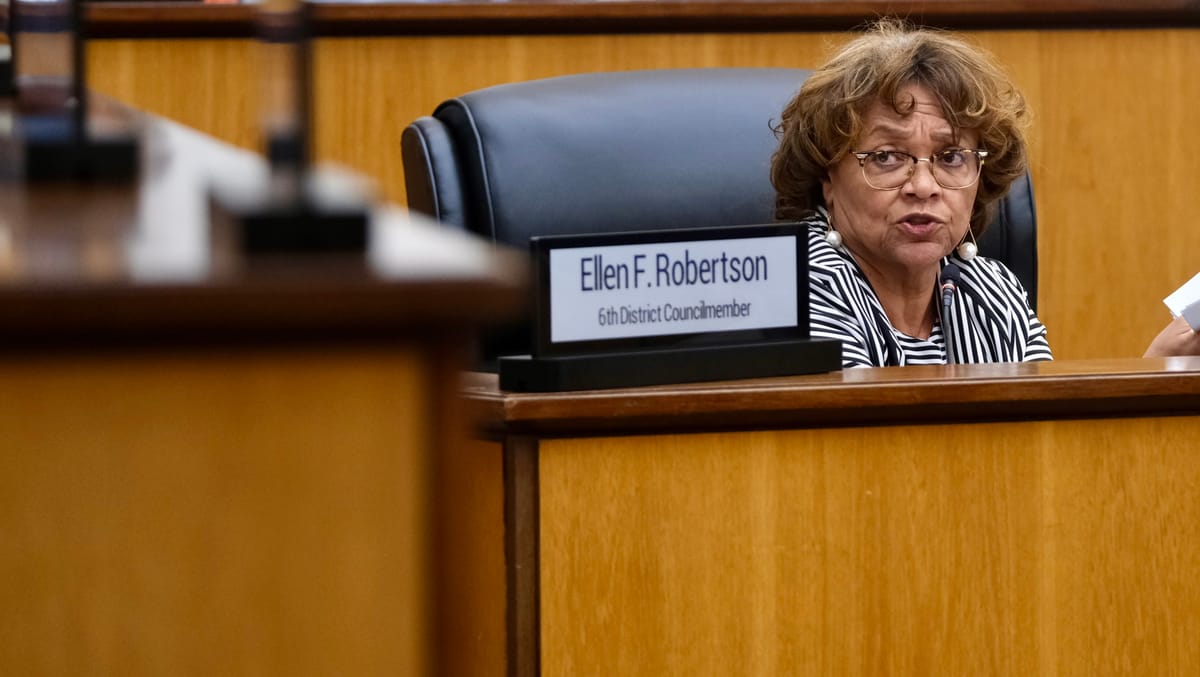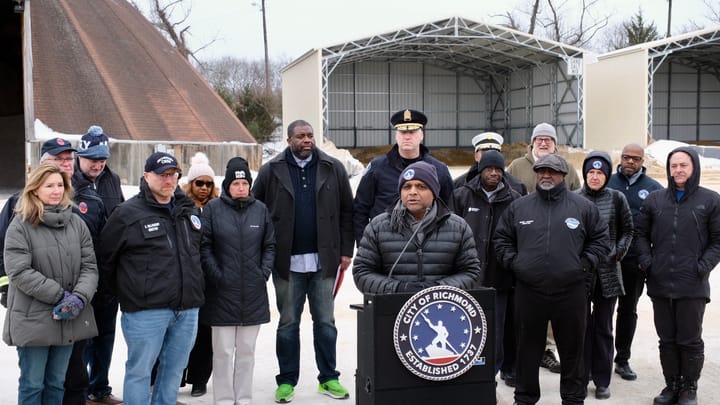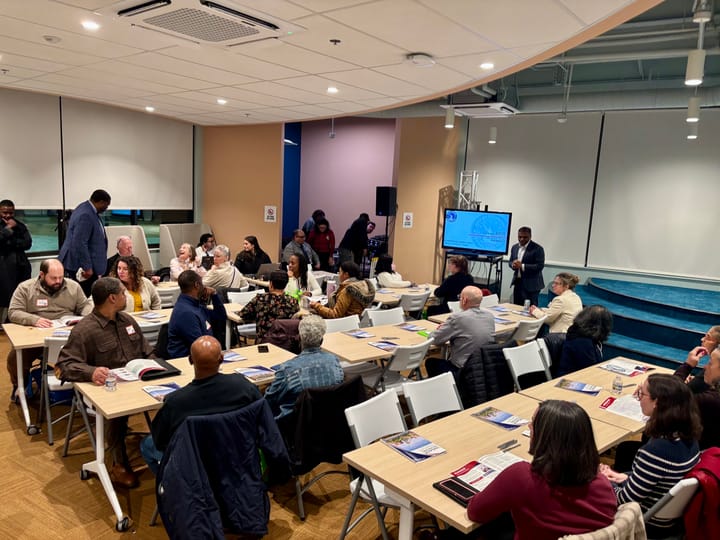Council advances plan to pay wrongfully convicted man, after fierce debate on financial policies

The Richmond City Council gave initial approval Tuesday for Richmond to pay $5.8 million in restitution to Marvin Grimm, a man who was wrongfully incarcerated for more than four decades after being linked to the death of a local boy in 1975.
The city is heading toward resolving the Grimm payment this month, motivated partly by Gov. Glenn Youngkin’s July threat to withhold state funding from Richmond if the city tried to resist paying Grimm.
However, the process of finding millions of dollars in unused city money has caused new tension among city policymakers over how Richmond stores public money and who gets to decide how to spend it.
Three Council members voted against the plan to reallocate money to pay Grimm. They made it clear they weren’t against paying Grimm in principle, but objected to the use of a $9.1 million pot of money the Council had previously identified as a source of funding for affordable housing projects.
“We talk about being short on funds, but when there’s $9 million sitting in a cushion somewhere, something’s not right,” said Councilor Kenya Gibson (3rd District), who voted against the measure along with Councilors Ellen Robertson (6th District) and Nicole Jones (9th District).
The 6-3 vote by the Council’s Organizational Development Committee advanced the Grimm payment to the full Council with a recommendation to pass it later this month.
To make the payment to Grimm, which is legally required under a newly adopted state law that just took effect July 1, the city is dipping into its delinquent tax sale fund, an account that holds proceeds from the city-initiated auctions of properties long delinquent on real estate taxes.
An ordinance the Council passed in 2019 directed officials to transfer up to $1 million per year from that fund into the city’s Affordable Housing Trust Fund. Those transfers didn’t happen as envisioned, sparking tense debate Tuesday over why it wasn’t done.
“The city’s been breaking the law for a long time,” said Steve Saltzberg of Richmonders Involved to Strengthen Our Communities (RISC), an activist group that pushes for increased affordable housing funding. “And I can’t imagine that sits well with any of you. Because it’s laws that you pass.”
New Chief Administrative Officer Odie Donald II, who joined the city in July, said he had gotten “a couple history lessons” on the matter from Robertson, who sponsored the 2019 ordinance. But Donald defended the decisions of past policymakers, suggesting the budgetary policy wasn’t followed each year because the city allocated tens of millions of dollars to affordable housing using one-time funding received during the COVID-19 pandemic.
“What you chose to do was something responsible,” Donald said. “You said we would fund affordable housing at the highest rate that we can using this money that we wouldn’t normally have gotten…. I don’t know that I would look at that negatively.”
Donald pointed out that the 2019 policy gave the Council discretion to transfer anywhere from zero to $1 million per year from the sales tax fund to the affordable housing fund.
That explanation seemed to come as a surprise to some Council members who have been serving since 2019, including Robertson. She said the city administration seemed to be relying on technical “glitches” to justify not following a policy approved by the legislative body.
“There’s a whole lot of law going on in here that I think is being stretched. That needs to be checked,” Robertson said.
Other members noted that the $9.1 million at issue went unmentioned during the budget season earlier this year, when numerous Council budget proposals were shot down due to a lack of funding.
“If you had told me there was $9 million hiding in a pot, I think we could have done some really incredible things,” said Councilor Sarah Abubaker (4th District).
Tuesday’s discussion caused another flare-up in the strained relationship between Councilor Reva Trammell (8th District) and Council President Cynthia Newbille (7th District).
At one point during the meeting, Trammell held up a thick document that she said was a list of tax-delinquent properties in Richmond and their owners.
“And we’re hurting for money. Really?” Trammell said. “You’ll be shocked when you see some of the damn names on here.”
Trammell then accused Newbille and Robertson of directing previous administrators not to try to collect unpaid taxes during the pandemic.
That drew an interruption from Newbille, who told Trammell: “You need to be accurate in your conveyance.”
Trammell said she was “sick and tired” of Newbille.
“You don’t run us,” Trammell said in a raised voice. “You don’t tell us what to do. I’ve got 25 years of service here.”
Despite the moments of conflict, Council members and the administration agreed that — as the Grimm matter is settled later this month — the city should revisit policies for devoting money to affordable housing.
Councilor Andrew Breton (1st District), said he didn’t want anyone to get the impression the city was “robbing” affordable housing money to pay Grimm. Instead, he said, by solving one problem, the city was discovering another.
“We need to make sure that we are not passing and leaving legislation on the books that we have no intention of following,” Breton said.
Several Council members said they want the General Assembly to review and potentially reconsider the unplanned financial impacts on local governments from the new state law on wrongful incarcerations, which requires local governments to match restitution agreed to by the state in cases where intentional law enforcement misconduct led to a wrongful conviction.
Robertson — who pointed to newly released real estate tax assessments as another example of how Richmond is getting increasingly unaffordable — said she’ll look into ways to correct the 2019 policy so it’s enforceable and can no longer be treated as optional.
“We can do better,” she said. “We’ve just got to do better.”
Contact Reporter Graham Moomaw at gmoomaw@richmonder.org
The Richmonder is powered by your donations. For just $9.99 a month, you can join the 1,000+ donors who are keeping quality local journalism alive in Richmond.






